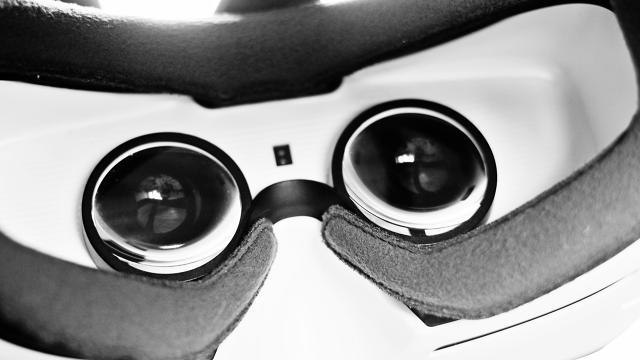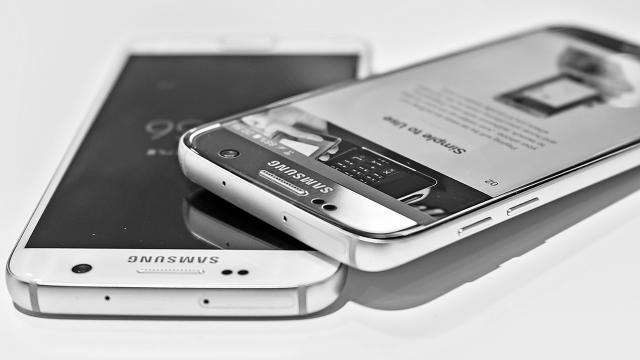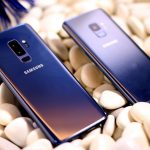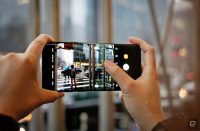Samsung Is Working Hard To Humanize Its Image
Samsung is getting an image makeover. Historically, the South Korean electronics giant has been seen by Westerners as huge, foreign, inscrutable, and old school. But the company is trying to put forward a different face in its public appearances and TV commercials.
At Samsung’s developer conference in San Francisco a few weeks ago, the people on stage were younger, stylishly dressed, and accessorized. They were funny and personable, and spoke fluent English. They were relatable, a quality not normally associated with Samsung.
This new image may be the externalization of a new attitude brought by DJ Koh (Koh Dong Jin), who, since late last year, leads Samsung’s global smartphone business. Part of the reason Koh was called up is because he’s a software and services guy, and Samsung believes software and services will be the catalyst for smartphone sales growth in the future. While running R&D for mobile software, Koh was responsible the development of Samsung Pay and the company’s Knox security framework.
He also brought with him a new, less formal, get-shit-done approach that’s now rippling through the company and its culture.
It’s also influencing Samsung’s brand image. The company’s top two phone marketing executives, Pio Schunker and Marc Mathieu, are charged with turning the Koh attitude into actual marketing content. Schunker leads the marketing effort for mobile products worldwide, while Mathieu leads marketing for all Samsung businesses (mobile, displays, and appliances) in North America.
Schunker and Mathieu have been around. They’re veteran marketing guys, both ex-Coke execs, and no strangers to managing global campaigns for high-profile brands.
I spoke with the two in mid-April at Samsung’s 837 product show space in the Meatpacking District of New York City. I wanted to find out how Samsung’s new vibe is making it all the way from Korea, and how its being articulated for Western markets.
FC: How do you work with the senior management team in Korea?
Pio Schunker: The three people that I deal a lot with are my immediate boss, Young Hee Lee; her boss, DJ Koh, who is the new president for mobile, and then JK Shin, the CEO. [Young Hee Lee is VP of global marketing for Samsung’s IT and mobile divisions.]
Marc Mathieu: Personally, I’ve been at Samsung a bit less than a year. I’ve been amazed by, for a company that size, how close actually I am to senior management, to the same people, and vice versa. How close they are, how involved they are.
Pio Schunker: The decisions get made so quickly. There’s no channels to walk through.
Pio Schunker: So, really, one of the first questions that senior management asked was how do we make this a great brand? Any great brand has a truth to it. “Sam” means three, and three in Asian culture, in Korea, represents the most powerful number that there is. “Sung” means stars, and the notion of shining brightly forever—that in order to be great, this is three stars who shine brightly forever. And that was the legacy of the company.
The wonderful thing was this enemy that they defined for themselves which was complacency. That complacency was the enemy of progress. And that if you don’t move forwards, you’re moving backwards.
So, we said, “Wow, that’s amazing that, you know, this is a philosophy laid out over the years that’s been there from day one.”
FC: Virtual Reality has become a huge part of your marketing campaigns. Why did you decide to double down on that theme?
Pio Schunker: Where Marc and I have had the dialogue in a really big way with senior management has been, it is no longer enough to just talk by the phone. You have to talk about the phone, plus a whole galaxy of products that it connects to.
So our push to senior management was, the market is maturing, so how do you move beyond the phone? And that’s really where the 360 camera and VR came in.
Marc Mathieu: And it is true that we felt that at some point phone marketing had become a little bit boring because it was focused on just the phone and the features.

FC: Who do you see as the core market for the VR stuff?
Pio Schunker: I think the temptation initially was “let’s go after gamers, let’s go after gamers.” And we said, “No, you can’t do that. There’s no scale to just doing that itself. There’s the scale has to come from actually tapping into people’s everyday lives and everyday usage.”
And that’s where the 360 [camera] plus the phone plus VR really becomes the killer trifecta. Because what’s this generation all about? They’re the selfie generation. You’re just basically taking the selfie, putting it into 360, slapping it in a VR machine, and suddenly transporting everyone there with you.
Movies. Entertainment is a given. Travel is a given. Those are going to be the things that I think people really easily respond to that give you scale. But I also think it’s going to be the content you create yourself that’s going to be the killer app.
FC: What’s this going to mean for content creation going forward?
Marc Mathieu: What does it change? How does an artist create for a 360 world? Does it mean you make an installation and you fill the installation, or does it mean you actually create an app to create in 360 a piece of art?
What excites me is that we are putting [this] into the hands of people, knowing that people are going to write the rules. And by the way, when I say people, I mean people. Not somebody high-end who has all the equipment and the big setup. We’re putting it into the hands of the common man, a 360 studio.

FC: Is the character or the personality of the Samsung brand changing? How?
Pio Schunker: One of the biggest discussions we had was that when you’re looking at premium brands, it’s about experiences. Experience is the new luxury to this [millennial] audience. And specifically to technology brands.
Our brand is not a brand that belongs to the elite. Our brand is a brand that is supposed to be a democratic brand. It is a brand based on listening, right? And we said, “When millennials love brands, they love brands because they give them access to things they could never have.” Right? And that’s the aspiration we have to live up to.
The (Galaxy S7) camera is so advanced. Fitting that camera into a phone, number one, with that kind of technology, and then, at the same time, making that that phone feel as ergonomic as it currently does…It’s an amazing feat.
FC: This is a premium phone though.
Marc Mathieu: Yeah. The beauty is that this is a $600 phone, but the Gear VR is $99. The Gear 360, the price is not released yet, but it’s going to be cheaper than the phone.
Pio Schunker: What we are trying to achieve is a brand that feels human, that there’s a warmth in the interaction, a degree of playfulness.
Marc Mathieu: Obviously, you don’t take yourself too seriously. In the last few ads, we used some celebrities. But we’ve picked celebrities that don’t take themselves too seriously, that can be playful. The Lil Wayne ads are not just because of Lil Wayne, but because he is Lil Wayne.
Pio Schunker: I don’t think we want to be a self-important brand. That’s very crucial for us in terms of how we define ourselves.
Marc Mathieu: One of the things, also, which is quite different, is…we didn’t talk about anybody else in this ad.
FC: You didn’t talk about anybody else? What do you mean?
Pio Schunker: There’s no reference point to anyone else from the category.
[Schunker and Mathieu are referring to Samsung’s rival, Apple, without saying the name.]
FC: Oh, well why would there be?
Pio Schunker: Exactly.
No, Samsung doesn’t need to mention the iPhone in its ads. It can keep telling its VR story, something Apple can’t do in its ads. Not yet.
Also, new research shows that Samsung just won back a market-share lead from Apple during March for the first time in almost a year. Samsung accounted for 28.8% worldwide smartphone sales, compared to Apple’s 23%, says Hong Kong-based research firm Counter Point.
Maybe tech consumers are buying into Samsung’s VR story. Maybe it’s because of Apple’s current iPhone slump. Maybe it’s because the Galaxy S7 is just a really good phone. Or maybe Samsung’s new vibe under Koh’s leadership is starting to break through.
related video: will virtual reality go mainstream?
Fast Company , Read Full Story
(34)














